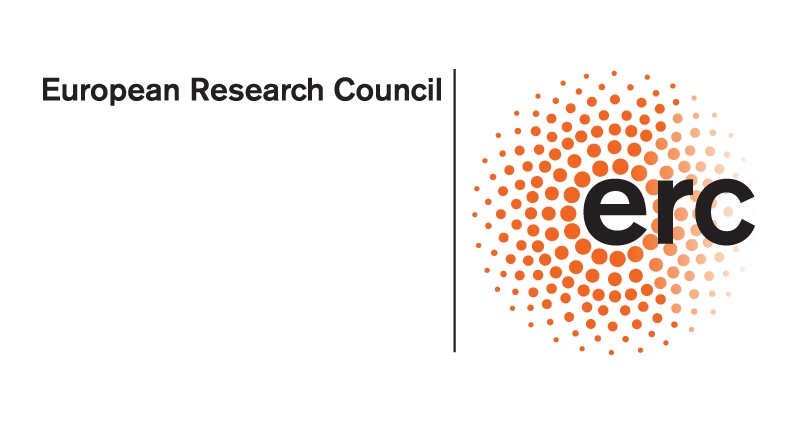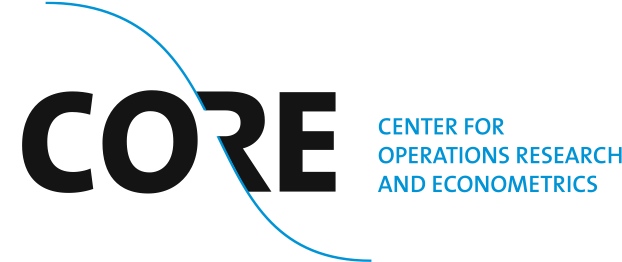Publications
 Well-being, poverty and labor
income taxation : theory and application to Europe and the U.S. /
François
Maniquet, Dirk Neumann Well-being, poverty and labor
income taxation : theory and application to Europe and the U.S. /
François
Maniquet, Dirk Neumann
CORE Discussion
Paper 2016/29 |
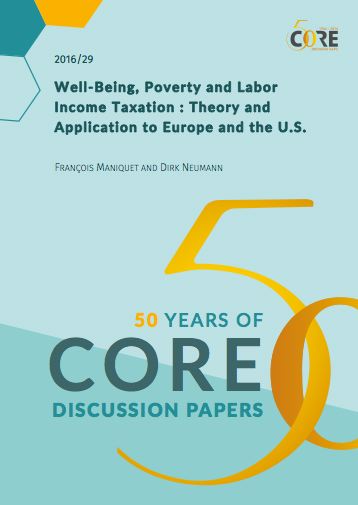 |
In
a model in which agents differ in wages and preferences over labor
time–consumption bundles, we study labor income tax schemes that
alleviate poverty. To avoid conflict with individual well-being, we
require redistribution to take place between agents on both sides of
the poverty line provided they have the same labor time. This
requirement is combined with efficiency and robustness properties.
Maximizing the resulting social preferences under incentive
compatibility constraints yields the following evaluation criterion:
tax schemes should minimize the labor time required to reach the
poverty line. We apply this criterion to European countries and the
US.
Appendices ...
|
 Social ordering functions / François
Maniquet
Social ordering functions / François
Maniquet
In: The Oxford handbook of well-being
and public policy / M.D. Adler, Marc
Fleurbaey. Oxford University Press, 2016, chap. 8
|
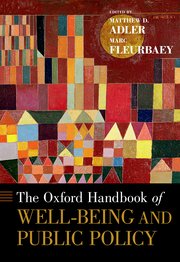 |
We
present the Fair Social Ordering approach to policy assessment. In an
economic model, a Social Ordering Function (SOF) associates each
economy in the domain with a complete ranking of the allocations. We
describe the main achievements of the SOF theory. We present two
applications, which show how SOF's can be used to evaluate policies.
The first application concerns labor income taxation. The second
application concerns the measurement of poverty. Finally, we discuss
the relationship between the SOF approach and some other approaches to
the construction of criteria to evaluate policies.
|
 Does the choice of
well-being
measure matter empirically ? An illustration with German data / Koen Decancq, Dirk Neumann
Does the choice of
well-being
measure matter empirically ? An illustration with German data / Koen Decancq, Dirk Neumann
In: The Oxford handbook of well-being
and public policy / M.D. Adler, Marc
Fleurbaey. Oxford University Press, 2016, chap. 19 |
 |
We
discuss and compare five measures of individual well-being, namely
income, an objective composite well-being index, a measure of
subjective well-being, equivalent income, and a well-being measure
based on the von Neumann-Morgenstern utilities of the individuals.
After examining the information requirements of these measures, we
illustrate their implementation using data from the German
Socio-Economic Panel (SOEP) for 2010. We find sizeable differences in
the characteristics of the individuals identified as worst off
according to the different well-being measures. Less than 1% of the
individuals belong to the bottom decile according to all five measures.
Moreover, the measures lead to considerably different well-being
rankings of the individuals. These findings highlight the importance of
the choice of well-being measure for policy making.
|
 A new index combining the
absolute and relative aspects of income poverty : theory and
application / Benoit Decerf A new index combining the
absolute and relative aspects of income poverty : theory and
application / Benoit Decerf
CORE Discussion
Paper 2015/50
|
 |
I
derive a new index combining the absolute and relative aspects of
income poverty. Earning a larger income decreases one’s absolute
poverty but experiencing a larger income inequality increases one’s
relative poverty. Provided that the individual poverty is not computed
based on the normalized income, the two aspects can be weighed such
that absolutely poor individuals are always considered poorer than
relatively poor individuals. Only the value of poverty aversion
associated with the Poverty Gap Ratio is consistent with this approach.
An application illustrates that the new index yields intuitive
judgments about unequal growth experiences, for which all absolute
(resp. relative) poverty indices systematically conclude that poverty
has decreased (resp. increased).
|
 Fair social orderings with
other-regarding preferences / Benoit Decerf, Martin Van der
Linden Fair social orderings with
other-regarding preferences / Benoit Decerf, Martin Van der
Linden
In: Social Choice and
Welfare, 2015
|
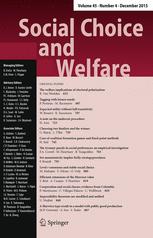 |
We study the construction of social
ordering functions in a multidimensional allocation problem where
agents have heterogeneous other-regarding preferences (ORP). We show
that there exists leximin social ordering functions satisfying equality
and efficiency principles. When equality is defined as equality of
resources, and ORP are only taken into account by efficiency
principles, some of these social ordering functions are independent of
the other-regarding part of preferences. When ORP are also taken into
account by equality principles, results depend on the degree of
resourcism of the social planner. If the planner still worries about
equality of resources, some of the social ordering functions satisfying
equality and efficiency remain independent of ORP. If the planner
departs from a resourcist notion of equality, then social-ordering
functions satisfying equality and efficiency must use information on
the other-regarding part of preferences.
|
 Tax policy and income
inequality in the United States, 1979–2007 / Olivier Bargain,
Mathias Dolls, Herwig Immervoll, Dirk Neumann, Andreas Peichl, Nico
Pestel, Sebastian Siegloch Tax policy and income
inequality in the United States, 1979–2007 / Olivier Bargain,
Mathias Dolls, Herwig Immervoll, Dirk Neumann, Andreas Peichl, Nico
Pestel, Sebastian Siegloch
In: Economic Inquiry, 2015 |
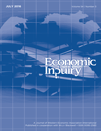 |
This
paper assesses the effects of U.S. tax policy reforms on inequality
over around three decades, from 1979 to 2007. It applies a new method
for decomposing changes in government redistribution into (1) a direct
policy effect resulting from policy changes and (2) the effects of
changing market incomes. Over the period as a whole, the tax policy
changes increased income inequality by pushing up the income share of
high-income earners (the top 20%).
|
 Distribution of human capital
and income : an empirical study on Indian States / Véronique
Gille Distribution of human capital
and income : an empirical study on Indian States / Véronique
Gille
In: Journal of
Macroeconomics, 2015 |
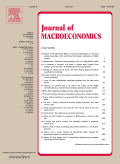 |
Recently,
an emphasis has been put on education as a key determinant for economic
development. But when increasing the mean level of education of their
population, developing countries face a trade-off: should they focus on
increasing the level of already educated children or try to put more
children into school and diminish illiteracy rates? In other words,
should countries favor a more unequal or a more equal distribution of
human capital? This paper empirically explores this question by
analyzing the relation between distribution of education and income per
capita with panel data from 29 Indian States. Using two different
measures of the distribution of education and dealing with the high
correlation between the mean education level and its distribution, this
paper provides evidence that there is a negative relation between
equality of education and income per capita. This result is robust to
the use of the system GMM estimator. However, the relation is
non-linear and depends on the level of development. This paper also
gives a first insight into the channels which are at stake and shows
that several mechanisms explain the impact of the distribution of
education. |
 Multidimensional poverty
measurement with individual preferences / Koen Decancq, Marc Fleurbaey,
François
Maniquet Multidimensional poverty
measurement with individual preferences / Koen Decancq, Marc Fleurbaey,
François
Maniquet
CORE Discussion
Paper 2015/08 |
 |
We
propose a new class of multidimensional poverty indices. To aggregate
and weight the different dimensions of poverty, we rely on the
preferences of the concerned agents rather than on an arbitrary
weighting scheme selected by the analyst. The Pareto principle is,
therefore, satisfied among the poor. The indices add up individual
measures of poverty that are computed as a convex transform of the
fraction of the poverty line vector to which the agent is indifferent.
The axiomatic characterization of this class is grounded on new
principles of interpersonal poverty comparisons and of inequality
aversion among the poor. We illustrate our approach with Russian survey
data between 1995 and 2005. We find that, compared to standard poverty
indices, our preference sensitive indices lead to considerable
differences in the identification of the poor and in subgroup poverty
comparisons.
|
 Optimal taxation theory and
principles of fairness / Marc Fleurbaey,
François
Maniquet Optimal taxation theory and
principles of fairness / Marc Fleurbaey,
François
Maniquet
CORE Discussion
Paper 2015/05 |
 |
The achievements and limitations of
the classical theory of optimal labor-income taxation based on social
welfare functions are now well known, although utilitarianism still
dominates public economics. We review the recent interest that has
arisen for broadening the normative approach and making room for
fairness principles such as desert or responsibility. Fairness
principles sometimes provide immediate recommendations about the
relative weights to assign to various income ranges, but in general
require a careful choice of utility representa- tions embodying the
relevant interpersonal comparisons. The main message of this paper is
that the traditional tool of welfare economics, the social welfare
function framework, is flexible enough to incorporate many approaches,
from egalitarianism to libertarianism. |
 Un concept d’échelles
d’équivalence du temps de travail pour l’évaluation de l’impôt sur le
revenu / François
Maniquet, Dirk Neumann Un concept d’échelles
d’équivalence du temps de travail pour l’évaluation de l’impôt sur le
revenu / François
Maniquet, Dirk Neumann
In: Revue
française d'économie,
2014 |
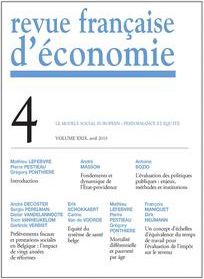
|
Nous proposons une méthode pour
évaluer la capacité des systèmes de taxation du revenu à diminuer la
pauvreté, lorsque celle-ci est définie en cohérence avec une notion de
niveau de vie issue de l’éthique de la responsabilité. Selon cette
éthique, toutes les inégalités ne sont pas injustes. Nous supposons que
les inégalités de revenu dues aux inégalités de temps de travail ne
sont pas injustes. Pour résoudre le problème de la comparaison entre
ménages de tailles différentes, nous introduisons un concept d’échelle
d’équivalence de temps de travail. Nous appliquons la méthode à
l’évaluation du système fiscal belge.
See also the Abstract (in
English) :
Labor-Time
Equivalence Scales and the Evaluation of Income Taxation Policies |
 Social ordering functions / François
Maniquet
Social ordering functions / François
Maniquet
CORE Discussion Paper 2014/51 |
 |
We
present the Fair Social Ordering approach to policy assessment. In an
economic model, a Social Ordering Function (SOF) associates each
economy in the domain with a complete ranking of the allocations. We
describe the main achievements of the SOF theory. We present two
applications, which show how SOF's can be used to evaluate policies.
The first application concerns labor income taxation. The second
application concerns the measurement of poverty. Finally, we discuss
the relationship between the SOF approach and some other approaches to
the construction of criteria to evaluate policies.
|
 Does the choice of
well-being
measure matter empirically ? An illustration with German data / Koen Decancq, Dirk Neumann Does the choice of
well-being
measure matter empirically ? An illustration with German data / Koen Decancq, Dirk Neumann
CORE Discussion Paper 2014/50 |
 |
We
discuss and compare five measures of individual well-being, namely
income, an objective composite well-being index, a measure of
subjective well-being, equivalent income, and a well-being measure
based on the von Neumann-Morgenstern utilities of the individuals.
After examining the information requirements of these measures, we
illustrate their implementation using data from the German
Socio-Economic Panel (SOEP) for 2010. We find sizeable differences in
the characteristics of the individuals identified as worst off
according to the different well-being measures. Less than 1% of the
individuals belong to the bottom decile according to all five measures.
Moreover, the measures lead to considerably different well-being
rankings of the individuals. These findings highlight the importance of
the choice of well-being measure for policy making.
|
 Comparing inequality aversion
across countries when labor supply responses differ / Olivier
Bargain, Mathias Dolls, Dirk Neumann, Andreas Peichl, Sebastian Siegloch Comparing inequality aversion
across countries when labor supply responses differ / Olivier
Bargain, Mathias Dolls, Dirk Neumann, Andreas Peichl, Sebastian Siegloch
In: International Tax and
Public Finance, 2014 |
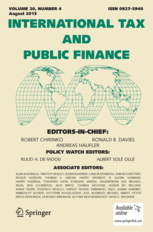 |
We analyze to which extent social
inequality aversion differs across nations when controlling for actual
country differences in labor supply responses. Towards this aim, we
estimate labor supply elasticities at both extensive and intensive
margins for 17 EU countries and the US. Using the same data, inequality
aversion is measured as the degree of redistribution implicit in
current tax-benefit systems, when these systems are deemed optimal. We
find relatively small differences in labor supply elasticities across
countries. However, this changes the cross-country ranking in
inequality aversion compared to scenarios following the standard
approach of using uniform elasticities. Differences in redistributive
views are significant between three groups of nations. Labor supply
responses are systematically larger at the extensive margin and often
larger for the lowest earnings groups, exacerbating the implicit
Rawlsian views for countries with traditional social assistance
programs. Given the possibility that labor supply responsiveness was
underestimated at the time these programs were implemented, we show
that such wrong perceptions would lead to less pronounced and much more
similar levels of inequality aversion. |
 Income
poverty measures with
relative poverty lines / Benoit Decerf
Income
poverty measures with
relative poverty lines / Benoit Decerf
CORE Discussion Paper 2014/22 |
 |
I
derive poverty indices taking into account both the absolute and
relative aspects of income well-being. The trade-off made by the social
planner between those two aspects is captured at individual level by a
well-being ordering. This ordering evaluates the well-being of an agent
based on her income and a reference statistic on the income
distribution, typically the mean. A family of poverty indices
respecting the judgements held in the ordering is axiomatically
characterized. Then, I study the consequences of requiring the poverty
indices to grant a minimal precedence to the absolute over the relative
aspect of income well-being. This compelling requirement has strong
implications. In particular, the Poverty Gap Ratio is the only index in
the popular Foster-Greer-Thorbecke family to satisfy it.
|
 Inequality,
income, and
well-being / Koen Decancq, Marc Fleurbaey, Erik Schokkaert
Inequality,
income, and
well-being / Koen Decancq, Marc Fleurbaey, Erik Schokkaert
CORE Discussion Paper 2014/18
|

|
Individual
well-being depends not only on income but also on other dimensions of
life, such as health, the quality of social relations and of the
environment, employment, and job satisfaction. In this paper we survey
the economic literature on how to construct such overall measures of
well-being. We distinguish three approaches: the capability (and
functionings) approach, the use of subjective life satisfaction
measures and the calculation of equivalent incomes. We discuss the
normative assumptions underlying these three approaches, focusing on
two issues: the degree to which individual preferences are respected
and where in each approach the boundaries of individual responsibility
are drawn. We compare the measurement of inequality in well-being with
the use of multidimensional inequality measures. We illustrate the
general theoretical issues in three domains of application: measuring
the effects of household size and composition in the literature on
equivalence scales, valuing publicly provided goods and services, and
making international comparisons of well-being involving international
PPP comparisons.
|
 Tax-benefit revealed social
preferences in Europe and the US / Olivier Bargain, Mathias
Dolls, Dirk Neumann, Andreas Peichl and Sebastian Siegloch Tax-benefit revealed social
preferences in Europe and the US / Olivier Bargain, Mathias
Dolls, Dirk Neumann, Andreas Peichl and Sebastian Siegloch
In: Annals of Economics
and Statistics, 2014 |
 |
We follow the inverted optimal tax
approach to characterize and compare “tax-benefit revealed” social
preferences in 17 EU countries and the US. Following Bargain et al.
[2013], we invert the optimal income taxation model on the
distributions of net and gross incomes and use labor supply
elasticities consistently estimated on the same data. The present paper
focuses on new outputs of particular interest for the current policy
debate on in-work versus traditional social transfers. Results are as
follows: We find that revealed marginal social welfare functions verify
minimal consistency checks and, notably, respect Paretianity overall.
An exception is due to the treatment of the working poor in countries
with standard, demogrant transfers. We illustrate for some countries
how the recent policy trend in Continental and Nordic Europe tends to
correct this “anomaly” through redistributive reforms in favor of the
working poor. Finally, we compare revealed and stated social
preferences using direct survey information and suggest explanations
for the apparent discrepancies. |
 Pauvreté, besoins et responsabilité dans l’impôt sur le revenu en Belgique / François Maniquet, Dirk Neumann Pauvreté, besoins et responsabilité dans l’impôt sur le revenu en Belgique / François Maniquet, Dirk Neumann
In: Le modèle social belge : quel avenir ? / P. Maystadt, e.a. Actes du 20e Congrès des économistes belges de langue française, 2013
|
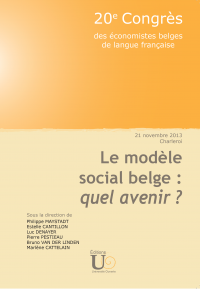 |
L’Etat-providence
est en question. Que de fois n’a-t-on pas entendu cet avertissement !
La banalité du propos n’enlève toutefois rien à la réalité du défi !
Avec ces mots, Philippe Maystadt introduit d’emblée la complexité et la
profondeur de la réflexion menée autour du modèle social belge. Dans
cet ouvrage, une quarantaine d'intervenants présentent leurs travaux de
recherche au sein de quatre commissions : 1. Le modèle social belge:
performance et équité ; 2. Le marché du travail comme composante du
modèle social ; 3. La soutenabilité du modèle social belge ; 4.
L'éducation et la formation dans la perspective du modèle social.
|
 Happy taxpayers ? Income
taxation and well-being / A. Akay, O. Bargain, M. Dolls, Dirk
Neumann, A. Peichl, S. Siegloch Happy taxpayers ? Income
taxation and well-being / A. Akay, O. Bargain, M. Dolls, Dirk
Neumann, A. Peichl, S. Siegloch
IZA Discussion Paper 6999 |
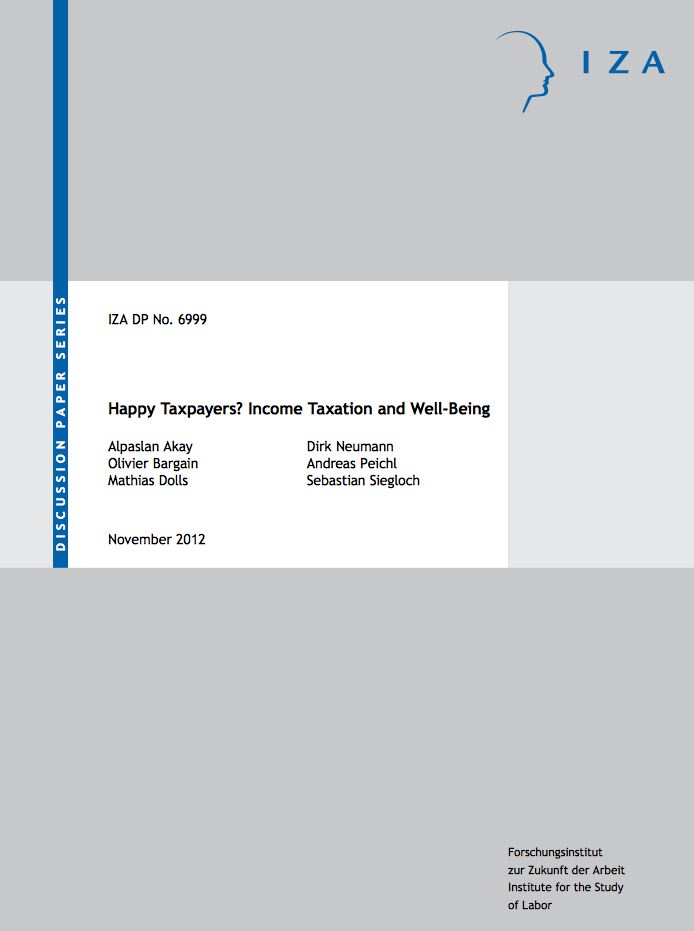 |
This
paper offers a first empirical investigation of how labor taxation
(income and payroll taxes) affects individuals' well-being. For
identification, we exploit exogenous variation in tax rules over time
and across demographic groups using 26 years of German panel data. We
find that the tax effect on subjective well-being is significant and
positive when controlling for income net of taxes. This interesting
result is robust to numerous specification checks. It is consistent
with several possible channels through which taxes affect welfare
including public goods, insurance, redistributive taste and tax morale. |
 Equality of
opportunity : the economics of
responsability / Marc
Fleurbaey, François
Maniquet
Equality of
opportunity : the economics of
responsability / Marc
Fleurbaey, François
Maniquet
World Scientific, 2012 - ISBN 9789814368872
|
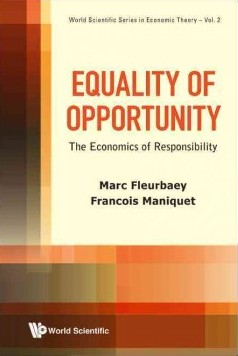 |
This
book is a collection of articles written by the two authors on the
topic of equality of opportunity. All articles build on the idea that a
just society should equalize the resources that determine the
opportunities agents face in order to follow their goals. Resources are
either external, like financial resources, or internal, like
preferences or skills. The authors propose to define "equality of
opportunity" as the combination of ethical principles of compensation
and responsibility. The principle of compensation requires external
resources to be used to compensate low-skilled agents (considering that
inequalities due to skill differences are unjust). The principle of
responsibility requires external resources to be allocated without
regards to inequalities due to differences in preferences (considering
that these inequalities are not unjust). The articles present different
ways of combining the two principles in different economic contexts.
|
 A theory of
fairness and social welfare / Marc Fleurbaey, François
Maniquet
A theory of
fairness and social welfare / Marc Fleurbaey, François
Maniquet
Cambridge University Press, 2011 - ISBN 9780521887427 |
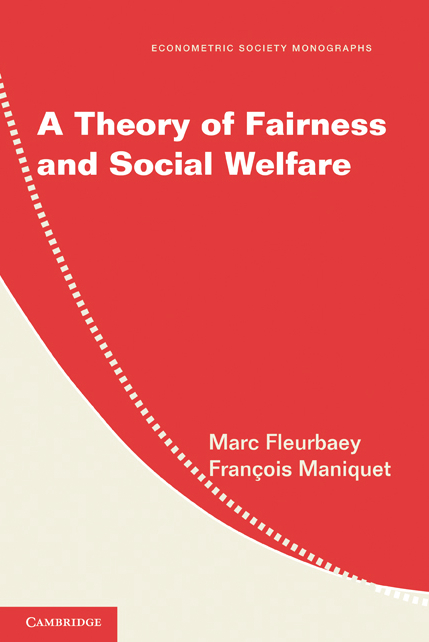 |
The definition and measurement of
social welfare have been a vexed
issue for the past century. This book makes a constructive, easily
applicable proposal and suggests how to evaluate the economic situation
of a society in a way that gives priority to the worst-off and that
respects each individual's preferences over over his or her own
consumption, work, leisure, and so on. This approach resonates with the
current concern to go "beyond the GDP" in the measurement of social
progress. Compared to technical studies in welfare economics, this book
emphasizes constructive results rather than paradoxes and
impossibilities, and shows how one can start from basic principles of
efficiency and fairness and end up with concrete evaluation of policies.
|
|
|
The
PoRESP Blog
The
PoRESP blog aims at providing information on scientific events, scientific papers and news on
poverty related topics.
|
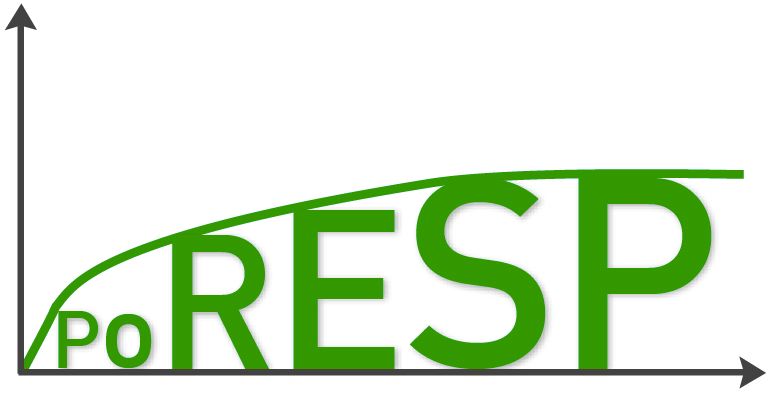
 The Project
The Project
 People
People
 Publications
Publications
 Work in
Progress
Work in
Progress  Scientific
Events
Scientific
Events  Collection
Collection
 Links
Links  Contact
Contact 


